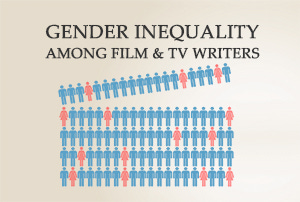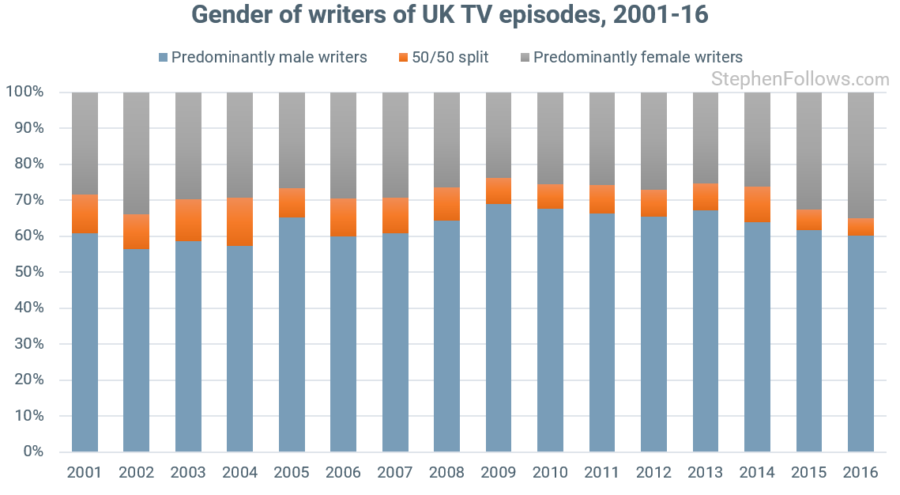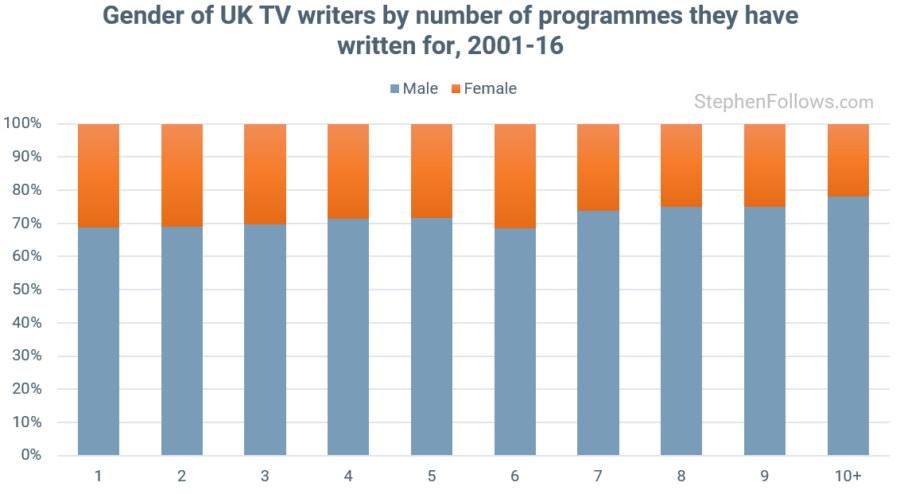Major new study into gender inequality among UK film and TV writers

Almost exactly two years ago, Alexis Kreager and I published a big report into the gender inequality faced by film directors working in the UK film industry.
Soon after it was published, we were approached by the Writers' Guild of Great Britain (WGGB) about studying the plight of screenwriters, both in the film and television industries. This led to the WGGB (along with the Authors' Licensing and Collecting Society - ALCS) supporting us in carrying out a deep data dive into the experiences of UK writers.
The full 177-page report can be downloaded here, and I have written a brief summary in the article below.
You can read more about the Writers' Guild and ALCS' campaign connected to the report at writersguild.org.uk/equalitywrites
The report covers both the film and TV industries. In this blog summary, I'll cover film first before turning to TV and finally looking at career progression among writers.
Female screenwriters of UK feature films
Over the twelve years we studied, women accounted for just 16% of screenwriters of UK feature films.
One way to think about it is to consider how many films have a majority female writing team (including those written exclusively by women). Between 2005 and 2016, four out of every five UK movies were written mainly by male writers.

If we broaden the question to ask 'how many UK films had even one female writer?' then we're still looking at under a quarter of all films made.

Public funding for female-written films
Around a fifth of all UK films have received some form of public funding support. This could be as little as a few thousand pounds at the development stage right up to full production funding covering the entire budget. Of the UK public funders, Creative England and BRITDOC (now called the Doc Society) and Film London are the most supportive of female-written feature films.

Female writers of UK television programmes
This blog focuses on the film industry, but the report looked equally at the film and television industries. If TV's your thing, then I suggest you download the full report because, for brevity's sake, I'm only going to include the headline TV stats here.
The picture for female writers of TV programmes is slightly better than that of feature film screenwriters but it is still rather grim. Between 2001 and 2016, only 30% of UK TV writers were female.

The journey to being a top writer
The report goes into a lot of detail about the path most writers take to the top of their profession, such as writing major movies and/or prime time TV, but I wanted to give a flavour of the findings here, too.
In film, women make up a smaller and smaller percentage of writers as you move up the experience spectrum. Of writers who had written one film in our dataset, 17% were women. Compare this with just 7% of writers who had written five or more films in our dataset and it's clear that not only are women finding it hard to get in, they are also struggling to stay in the industry.

The picture is similar in TV. Male writers dominate at prime time, and their dominance increases as the spots become more prestigious (and valuable to advertisers). 62% of UK TV episodes shown at 6pm are written predominantly by men, compared with 86% of shows airing at 9pm.

As well as finding it harder to write for prime time shows, female writers are also having a harder time working on a broad selection of shows, compared to male writers. Of those who have only written for one show, 31% were women, compared with 22% of those who had written for ten or more shows.

The journey women take to the upper echelons of screenwriting can be simplified into one chart. At each major stage of career progression, we see women accounting for an ever smaller percentage of writers.

N.B. "CDS" refers to continuing drama series, such as EastEnders, Casualty, Hollyoaks, Emmerdale, Coronation Street, Holby City, Doctors, etc.
An interesting note to end on
Reports like this are never fun to read (or to research and write, for that matter!) And so, in an effort not to end on such a bleak note, I wanted to share a minor finding from the research process.
We were looking at what evidence there was to explain the gender imbalance beyond just an industry-wide unconscious bias (i.e. are female writers unable or unwilling to do what male writers are?) Unsurprisingly, we did not find any evidence that female writers are any less able, talented or hardworking than their male counterparts. In fact, we found that both critics and audiences judge films from female writers as slightly better than those written by men.

Notes
The report contains detailed explanations of our data, methodology and important clarifications and caveats. If you would like to use the findings in this article then I suggest having a read of the notes in the full report to ensure you're getting the complete picture.
My co-author Alexis Kreager took the lead with the project and it's fair to say that without him it would not have happened. I'm grateful to him for his dedication, focus and hard work.
I'm also grateful to the Writers' Guild of Great Britain (WGGB) and Authors' Licensing and Collecting Society (ACLS) for supporting the report, both in resources and data. You can read about their campaign which follows this report at www.writersguild.org.uk/equalitywrites.
Epilogue
This is the second major report I've co-authored into gender inequality in the UK film industry. On the one hand, it is rather depressing to get deep into the topic and see how unequal our industry remains. On the other, it's inspiring to meet so many people along the way who are determined that change is possible and are willing to play their part.


